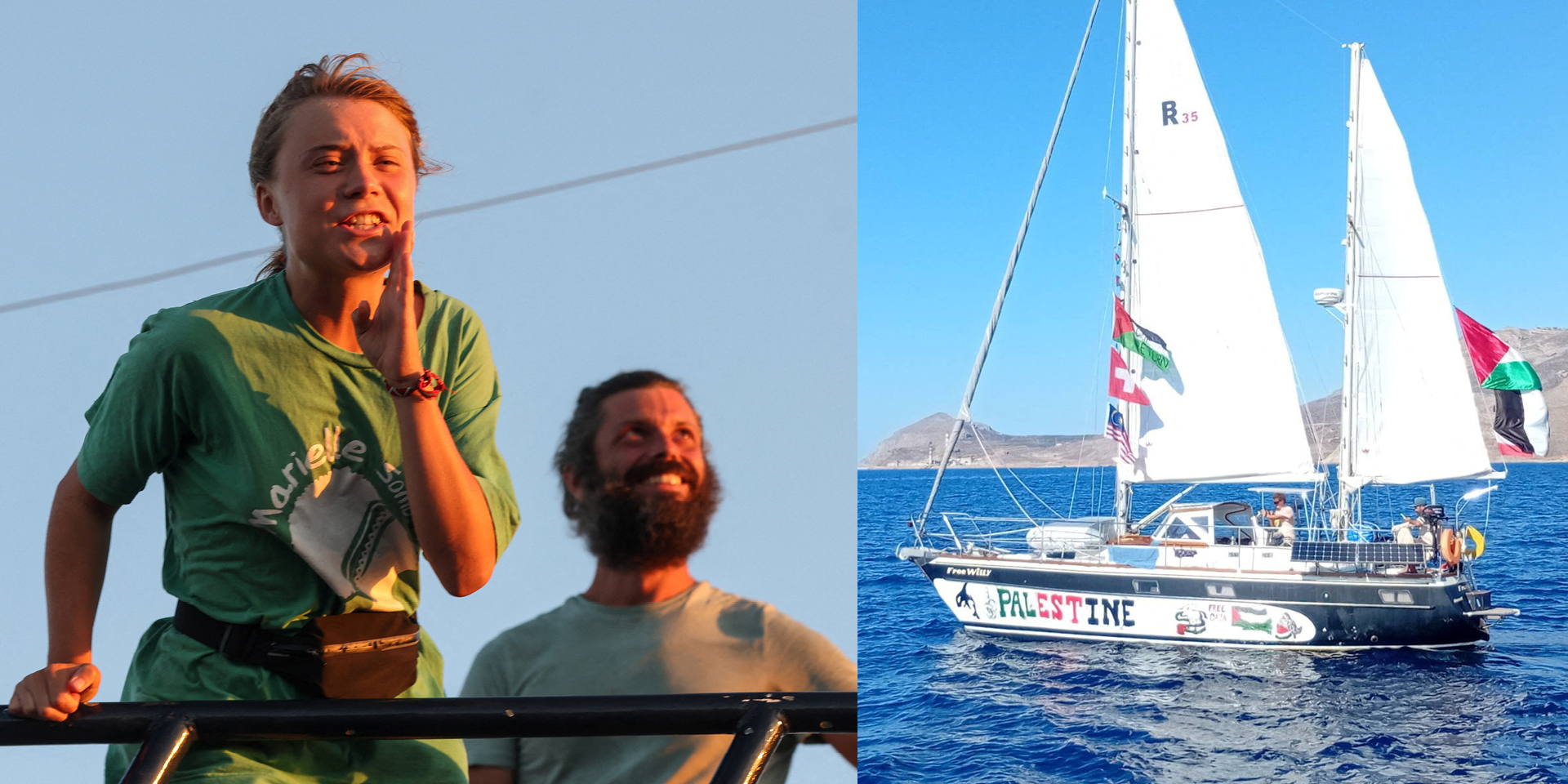Another Incoming Flotilla: Israel Seeks to Confiscate Vessels Without Paying a Fortune
Fifty-two vessels are taking part in the largest protest flotilla ever organized to challenge Israel’s naval blockade of the Gaza Strip. Among the activists on board is Swedish climate campaigner Greta Thunberg. Ahead of the flotilla’s expected arrival near the Israeli coast, the government is advancing new legislation aimed at cutting legal red tape and reducing the potential costs of storing confiscated boats for extended periods.


Fifty-two vessels are taking part in the largest protest flotilla ever organized to challenge Israel’s naval blockade of the Gaza Strip. Among the activists on board is Swedish climate campaigner Greta Thunberg. Ahead of the flotilla’s expected arrival near the Israeli coast, the government is advancing new legislation aimed at cutting legal red tape and reducing the potential costs of storing confiscated boats for extended periods.

Fifty-two vessels are taking part in the largest protest flotilla ever organized to challenge Israel’s naval blockade of the Gaza Strip. Among the activists on board is Swedish climate campaigner Greta Thunberg. Ahead of the flotilla’s expected arrival near the Israeli coast, the government is advancing new legislation aimed at cutting legal red tape and reducing the potential costs of storing confiscated boats for extended periods.
Right: One of the 52 flotilla boats near Crete. Left: Greta Thunberg on board the ship near the coast of Crete. Photos: Reuters

Uri Blau
September 29, 2025
Summary


Listen to a Dynamic Summary of the Article
Created using NotebookLM AI tool
As another flotilla of protest boats makes its way toward the coast of the Gaza Strip, carrying activists and aid, the Israeli government is planning to make it easier to confiscate vessels which violate its naval blockade of the besieged Palestinian territory. The move comes in response to difficulties faced by Israeli authorities when dealing with similar flotillas, and is supposed to cut the amount of time that Israel waits between confiscating the vessels and selling them. Legal experts, however, warn that the change will not really solve the problem.
There are currently 52 vessels making up the Global Sumud Flotilla, the stated goal of which is to break Israel’s blockade of Gaza. According to the website which is tracking the flotilla’s progress, most of the vessels are currently sailing and are expected to arrive to Israel in the coming days. Among the activists on board is Swedish climate campaigner Greta Thunberg.
Israel offered organizers of the flotilla to offload their aid cargo at Ashdod Port, where security officials would inspect it, before moving it on to Gaza – but, as previous flotillas did – they rejected the proposal. Therefore, the Israeli Navy is preparing to intercept the vessels, as it has done in previous cases. This time, however, the number of ships in the flotilla makes the mission especially hard for the Navy, as well as creating a logistical conundrum when it comes to storing dozens of vessels.
The Israeli government hopes to rely on legislation from the time of the British Mandate to confiscate the vessels. The first time it used this law was in 2012, when the Estelle – a Finnish-flagged, Swedish-owned schooner carrying activists, cement and educational items – was intercepted some 30 nautical miles off the coast of Gaza. The crew and activists were deported and the cargo handed over to the Palestinian Authority. However, negotiations over the release of the vessel hit an impasse and the state asked the Haifa District Court, which also acts as Israel’s national Maritime Court, to grant it permission to confiscate it.
In his ruling, Judge Ron Sokol rejected the request, saying that the state had only filed its motion some 10 months after taking control of the vessel and not within the time period that the law demands. The High Court of Justice also rejected the state’s appeal of Sokol’s ruling, although both courts reaffirmed Israel’s right to confiscate any vessel that tries to break the naval blockade of the Gaza Strip. Since then, additional ships have been confiscated and the state has learned the lesson: it now files timely confiscation requests, allowing it to legally seize and sell the vessels and to transfer the money raised to the treasury. The process remains complex, however, because Israel is obligated to try and locate the owners of the vessels.
An analysis of legal cases from the past year, as well as a memorandum for a temporary provision recently circulated by the Ministry of Justice, shows that, in addition to posing military and diplomatic challenges to Israel, the Gaza flotillas also put “a heavy burden [on the IDF] in terms of the resources needed to hold all the vessels and where to dock them.”
In July this year, for example, the Navy boarded the Madleen, which attempted to reach Gaza as part of the Freedom Flotilla Coalition – also with Thunberg on board. When it approached the court, the state said that it was finding it hard to locate the owners of the vessel – a necessary stage of the legal process of confiscation. A representative of the state told the court that, when the Madleen was boarded, “the captain, Mark van Reenes, was detained along with other passengers and crew until their deportation from the State of Israel. During van Reenes’ detention, officials tried to hand him the official confiscation order, but he refused to sign it and declared that he would not voluntarily hand over the vessel.”
The state explained to the court that it had tried to locate the owner of the Madleen to inform them of Israel’s intention to confiscate it. The representative even presented the court with dozens of pages of correspondence with the DHL courier service, proving that an effort was made – albeit in vain – to inform at least one of the owners that Israel was planning to confiscate it.
A month later, Israel seized the Handala, which was also part of the Freedom Flotilla Coalition, and the state submitted another confiscation request. “An analysis of the documents and intelligence gathered while preparing for the arrival of this flotilla, it became evident that the registered owner of the vessel was Frank Joseph Romano,” the state told the court. However, Romano refused to cooperate with the hearing and did not respond to any of Israel’s communications. While all these legal cases were being heard, it was down to the Navy to foot the bill for docking the vessels, which comes at a high cost.
The new regulations: A confiscation notice stuck to the mast
Now, with a massive flotilla making its way to Gaza, the state is seeking to rid itself of this burden. According to the new regulations drawn up by the Ministry of Justice, the entire confiscation process will take no longer than 180 days. As part of the new legislation – which, if approved by the Knesset, will go into effect within days – the state says that it will affix a confiscation notice to the vessel’s mast and that, if Israeli officials are unable to locate the owner or their residential address, it can make do with sending an email. The vessel’s owner will have 30 days to appeal, the hearing will be held behind closed doors and, according to the new legislation, will last just one day.
Maritime law expert attorney Yoav Harris, however, does not believe that the new legislation will solve the problem – as he wrote in his comments on the draft regulations. “Establishing a timeframe of 180 days will not resolve the military’s difficulty in maintaining custodial possession of the vessels – that is, holding them in trust – as this duration is lengthy in itself. Moreover, this period would necessarily be followed by a forfeiture proceeding – specifically, a public auction overseen by the Maritime Court with the subsequent transfer of the proceeds to the State Treasury, should the seizure and confiscation be judicially approved,” he wrote.
In a conversation with Shomrim, Harris added that he believes it would be more effective to sell the vessels immediately and for a court to hold the revenue in trust until a final ruling is reached. Alternatively, he says that Israel could release the vessels in exchange for a deposit, also to be held by the court until the end of proceedings. In the context of the flotilla currently approaching Israel, however, even this does not provide an adequate solution.
Harris explains that it will be hard for Israel to find anywhere to dock such a large number of vessels and, in any case, would be unlikely to find buyers for all of them. He adds that Israel does not have the facilities to store the towed vessels and that towing them to a port overseas would entail more expense. Harris believes that Israel should consider allowing the vessels to approach the Gaza coast and arrest them once they reach the shore.













